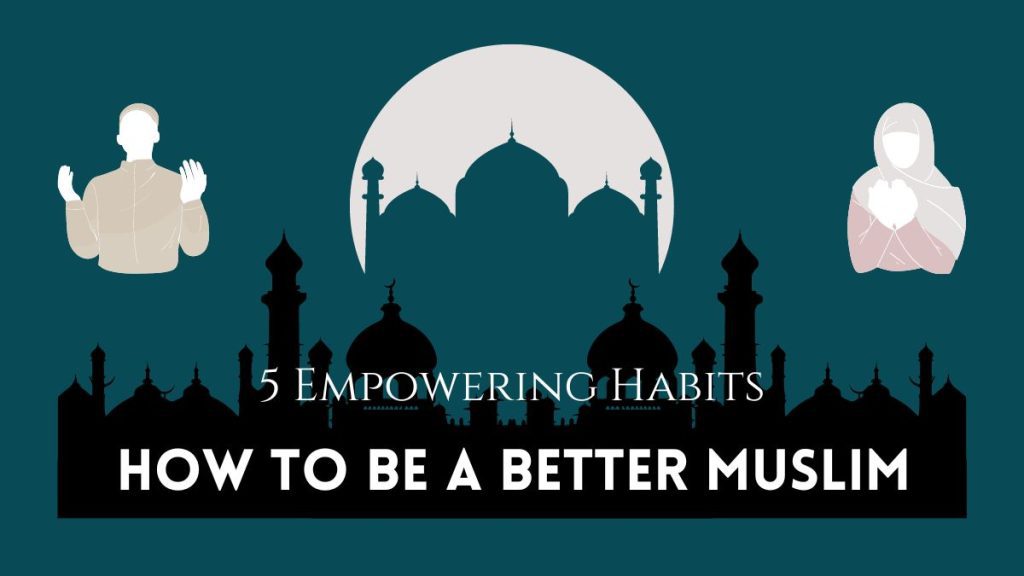To be a better Muslim, actively learn and practice the teachings of Islam. Engage regularly in prayer and good deeds. Here, we will discuss how to be a better Muslim and how to gear up for betterment regularly.
Being a better Muslim is a continuous journey of faith, discipline, and personal growth. Islam encourages followers to deepen their understanding of the religion and apply its principles in daily life. Strengthening one’s connection with Allah through the five daily prayers, the study of the Quran, and the performance of acts of kindness helps in this spiritual progression.
It’s essential to embody the values of honesty, patience, charity, and forgiveness—core aspects of Islamic teaching. Self-improvement in Islam is not just about personal piety; it extends to fostering a compassionate community and contributing positively to society. The quest to enhance one’s practice of Islam also involves seeking knowledge, maintaining a strong moral character, and having a consistent drive to do better each day.
Related Article: The Power of Islam: Unleashing its Transformational Potential

Related Article: Peace in Islam: Understanding its Amazing Transformational Power
Embracing Prayer With Serenity
Embracing prayer in Islam is not just a ritual, but a moment of peace and connection. Serenity in prayer comes from understanding and feeling the presence of the divine. It transforms the obligatory act into a nourishing spiritual experience. To be a better Muslim, one’s journey can deeply benefit from enriching the practice of Salah (prayer) with sincerity and attentiveness. Let’s explore how to achieve tranquility through prayer and make each moment with Allah count.
Prioritizing The Five Daily Prayers
- Fajr – Wake up before sunrise to begin the day with a clear intention.
- Dhuhr – Take a break from daily tasks to reconnect with your faith.
- Asr – Reflect on the day’s activities, seeking divine guidance.
- Maghrib – Acknowledge the day’s blessings at sunset.
- Isha – End the day with reflection, setting a peaceful tone for sleep.
Making these prayers a priority requires discipline. Set alarms, remain consistent, and prepare your environment to help focus your mind.
Related Article: Islamic Spirituality: Unlocking Inner Peace and Enlightenment

Credit: www.linkedin.com
Related Article: What Makes Islam Unique: Insights & Distinctions
Cultivating Khushu In Salah
Khushu means deep concentration and humility in prayer. It is a state where the heart stands before the Creator in awe. Here’s how to cultivate Khushu:
| Action | Effect |
| Understanding the words | Enhances connection to the prayer |
| Slow movements | Fosters a sense of reverence |
| Focused breathing | Calms the mind, enabling focus |
| Meditation before Salah | Prepares the mind for worship |
Practicing these actions in every Salah can open the doors to a deeper spiritual experience.

Credit: www.amazon.com
You may also read: Hijamah: Ancient Healing Practice with Modern Benefits
Quranic Connection For Spiritual Growth
As Muslims seek a deeper faith, the Quran stands as a guiding beacon. Its timeless wisdom serves as a roadmap for personal refinement and spiritual development. Understanding and leveraging the Quran can transform daily life, enrich prayer and foster a stronger relationship with the Creator.
Consistent Recitation And Reflection
Daily Quranic recitation represents more than tradition; it anchors the soul, renewing faith and inspiring action. Devote a specific time each day for reading the Quran. Reflection on its teachings allows individuals to connect with its profound messages.
Strategies for Effective Recitation:
- Set achievable goals – Start with a few verses daily.
- Create a routine – Recite at the same time every day.
- Personal reflection – Consider the impact of the verses.
Memorizing Verses And Understanding Tafsir
Memorization of Quranic verses enhances retention and instills divine principles. Embarking on this journey introduces a wealth of spiritual benefits.
| Memorization Tip | Benefit |
| Start with short Surahs | Easier recall during prayer |
| Repeat daily | Strengthens memory muscle |
| Seek help | Improves understanding and pronunciation |
Comprehending Tafsir, the exegesis or commentary of the Quran, illuminates divine commandments. Reading Tafsir clarifies context, ensuring verses impact thought and behavior precisely as intended.
Dive deeper into the lessons of the Quran with organized study sessions or classes. Learning Tafsir encourages thoughtful living and elevates moral consciousness.
Find study materials:
- Reliable Tafsir books
- Online resources with scholarly annotations
- Community study groups
Pair memorization with Tafsir to embody Quranic teachings with clarity and conviction.
Character Refinement Through Sunnah
In the pursuit of becoming a better Muslim, character refinement plays a pivotal role. The Sunnah—the way of life prescribed as normative in Islam on the basis of the teachings and practices of the Islamic prophet, Muhammad—provides a blueprint for moral and spiritual development. By aligning actions and demeanor with the Prophetic examples, Muslims can enhance their character. This can lead to personal improvement and a positive impact within their communities. Let’s delve into how adopting Sunnah in daily life can aid in refining one’s character.
Adopting Prophetic Manners
Prophet Muhammad’s manners were exemplary; his kindness, honesty, and respect set a standard for Muslims to follow. Understanding and embracing these manners involves:
- Respect for all: Treating everyone with dignity regardless of status.
- Truthfulness: Always speaking the truth and avoiding falsehood.
- Kindness: Showing compassion towards others, including animals.
- Humility: Being humble and avoiding arrogance.
The incorporation of these manners can significantly enhance social interactions and self-discipline.
Practicing Patience And Gratitude
The Sunnah emphasizes the virtues of patience and gratitude. Practicing these traits involves:
- Responding with calmness during trials.
- Being patient with others’ mistakes and shortcomings.
- Finding reasons to be thankful even in hard times.
Building these habits can lead to a more content and holistic lifestyle. Patience helps in overcoming difficulties, while gratitude brings positivity to life.
Community Involvement And Charity
Being a better Muslim stretches beyond personal acts of worship. It extends into how one interacts with the community. Community involvement and charity form the backbone of social service in Islam. Engaging with your community and providing charitable support are profound acts of faith. They reflect a commitment to the welfare of others, which is highly regarded in Islam.
Engaging In Volunteer Work
Volunteer work is a powerful way to give back to your community. It embodies the Islamic principle of helping others and enriching lives. Consider these steps:
- Identify local needs: Look around your community. Find areas that need help.
- Commit your time: Dedicate a few hours weekly or monthly to volunteer.
- Use your skills: Offer what you’re good at to benefit others.
Joining hands with local organizations can amplify your impact. Transform words into action; start volunteering today.
Regular Zakat And Sadaqah
Zakat and Sadaqah are financial acts of worship. They are essential in Islam for social well-being. Zakat is obligatory, while Sadaqah is voluntary yet incredibly valuable. Follow these best practices:
- Calculate Zakat accurately: Ensure you give the rightful share.
- Be consistent with Sadaqah: Even small regular acts can create big waves of change.
- Seek the needy: Direct your charity to those who need it most.
Charity purifies wealth and fosters a sense of brotherhood. Embrace the spirit of giving. Embark on a lifetime habit that nurtures generosity.
Pursuing Knowledge And Continuous Learning
The quest for knowledge is a vital part of being a better Muslim. Islam places immense value on education and the continuous pursuit of wisdom. Every Muslim aims to grow in understanding of their faith. This growth transforms every action into one of informed worship. Whether it’s through seeking Islamic scholarship or applying fiqh in daily life, learning remains a lifelong journey.
Seeking Islamic Scholarship
Deepening one’s understanding of Islam often begins with seeking scholarship. Knowledgeable teachers guide learners through Quranic interpretation and Hadith. Joining study circles and attending lectures provide structured environments for learning. Students may also opt for online courses, allowing flexibility and access to renowned scholars worldwide.
- Find a mentor or a knowledgeable person in the community.
- Participate in local or online Islamic classes.
- Read widely from authentic sources to diversify insights.
Applying Fiqh In Daily Life
Fiqh, or Islamic jurisprudence, governs a Muslim’s daily conduct. It offers guidance for all facets of life. The aim is to reflect Islamic principles in everyday actions. This requires not just theoretical knowledge but also practical application. Engage in community service, be consistent in prayers, and uphold high ethical standards in business and personal interactions.
- Embrace Halal living in food, finance, and work.
- Adopt regular prayer and reflection to instill discipline.
- Use Islamic guidelines to make decisions in complicated matters.
Related Article: Zakat: Transforming Lives Through Compassionate Giving

Credit: aishameguid.com
Related Article: Tawheed: The Essence of Islamic Monotheism Explained
Conclusion
Embarking on the journey to improve yourself as a Muslim is both enriching and fulfilling. Consistent steps, guided by the principles we discussed, will lead you closer to the spiritual fulfillment you seek. Embrace your faith with commitment, and let your actions reflect the profound teachings of Islam.
Remember, personal betterment is a continuous path, with each day offering a new opportunity to grow.
Related Article: How Does Islam Affect Daily Life: Unveiling the Impact
Related Article: Islam And Modernity: Bridging Tradition and Progress





5 thoughts on “How to Be a Better Muslim: 5 Empowering Habits”